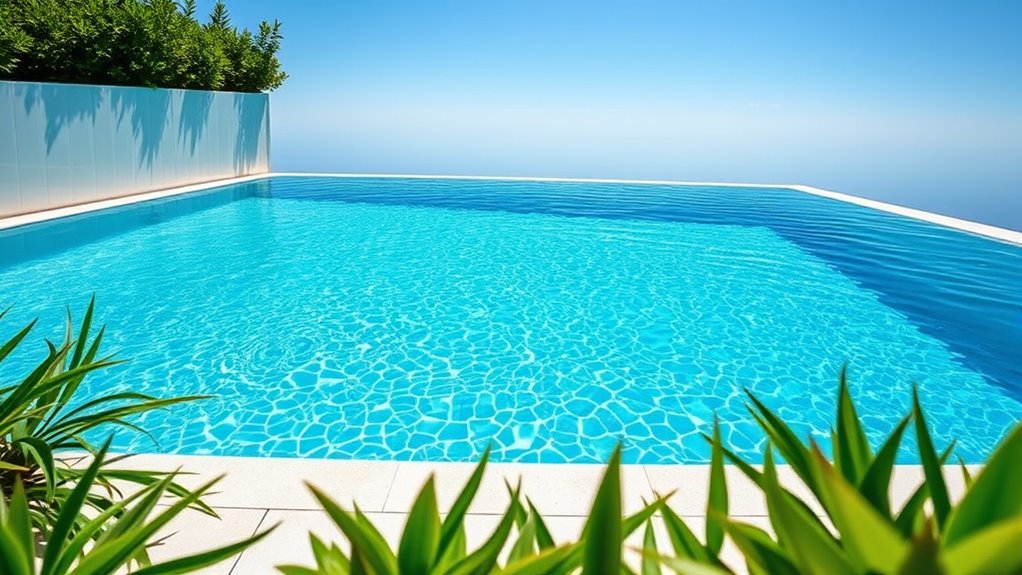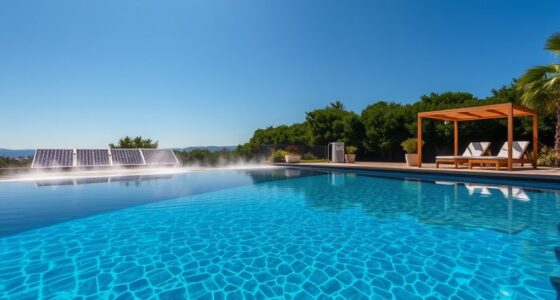To waterproof infinity pool walls, choose a durable solution like liquid-applied membranes such as polyurethane or acrylic for seamless coverage, or sheet membranes like PVC for flexibility. Consider factors like weather exposure, wall condition, and budget to pick the best option. Proper application—cleaning surfaces, applying coats evenly, and inspecting joints—is essential for long-lasting protection. Stay informed on latest innovations to guarantee your pool stays secure for years; more tips await you.
Key Takeaways
- Choose seamless liquid-applied membranes like polyurethane or acrylic for flexible, waterproof barriers on pool walls.
- Opt for sheet membranes such as PVC or EPDM for reliable, easy-to-install waterproofing solutions.
- Use cementitious coatings with waterproofing additives for cost-effective, durable protection.
- Consider epoxy-based coatings for excellent chemical resistance and strong adhesion on pool surfaces.
- Regularly inspect and maintain waterproof layers, focusing on cracks, joints, and sealants to ensure long-term effectiveness.
Types of Waterproofing Materials for Infinity Pool Walls
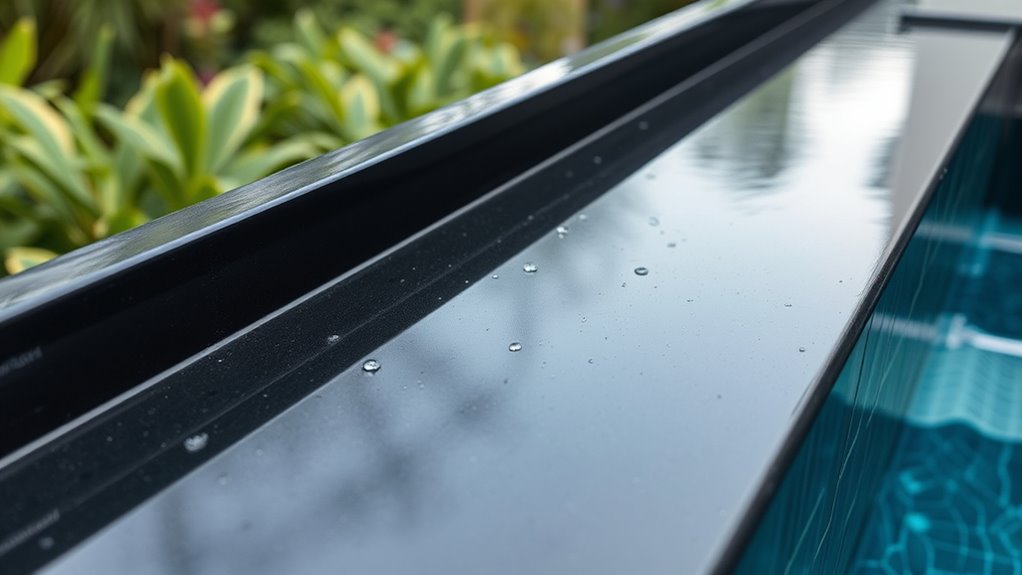
When choosing waterproofing materials for infinity pool walls, it’s crucial to take into account the specific demands of aquatic environments. You’ll want durable options that resist water pressure, chemicals, and UV exposure. Liquid-applied membranes, like polyurethane or acrylic coatings, create seamless barriers that adapt to surface movements. Sheet membranes, such as PVC or EPDM, are flexible and easy to install, providing reliable waterproofing. Cementitious coatings, mixed with waterproofing additives, are cost-effective and suitable for structural walls. Additionally, epoxy-based coatings offer excellent chemical resistance and adhesion, making them ideal for high-stress areas. Each material has its advantages, so you need to weigh factors like flexibility, longevity, and ease of application to select the best solution for your infinity pool walls. Incorporating waterproofing techniques can further enhance the durability of your installation and prevent leaks over time.
Factors to Consider When Selecting Waterproofing Solutions
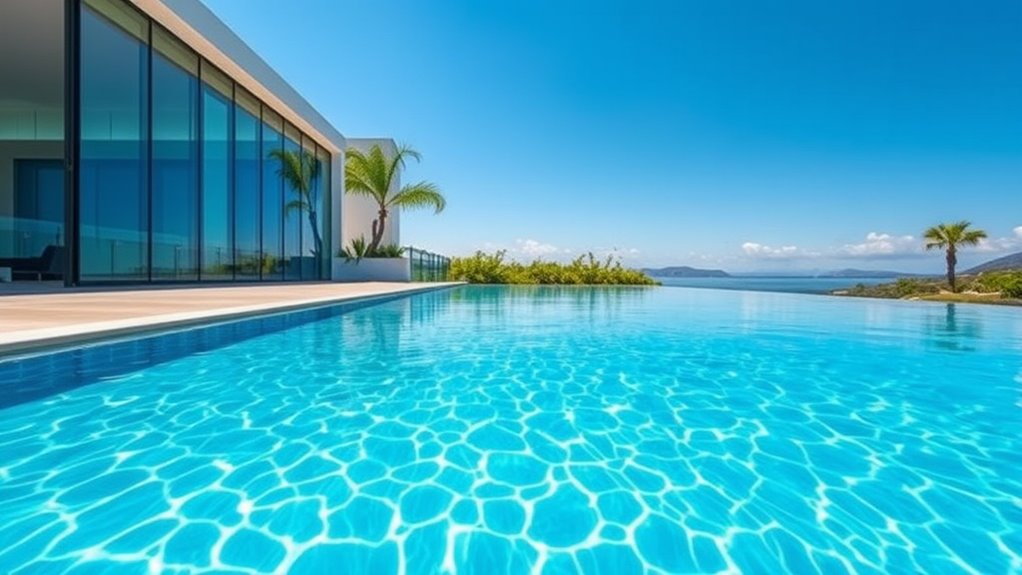
Choosing the right waterproofing solution for your infinity pool walls requires careful consideration of several key factors. First, assess your pool’s exposure to weather and UV rays, which can degrade materials over time. Next, evaluate the structural condition of your walls to ensure compatibility with the waterproofing method. Budget constraints also influence your choice, balancing cost with durability and performance. Additionally, consider the ease of application and maintenance requirements to avoid future complications. Use the table below to compare these factors:
| Factor | Importance |
|---|---|
| Exposure Conditions | Determines material resilience |
| Wall Condition | Guides suitable waterproofing techniques |
| Budget & Maintenance | Affects long-term costs and efforts |
Furthermore, selecting a waterproofing material that is compatible with vetted products ensures effectiveness and safety over time.
Application Techniques for Optimal Waterproofing Performance
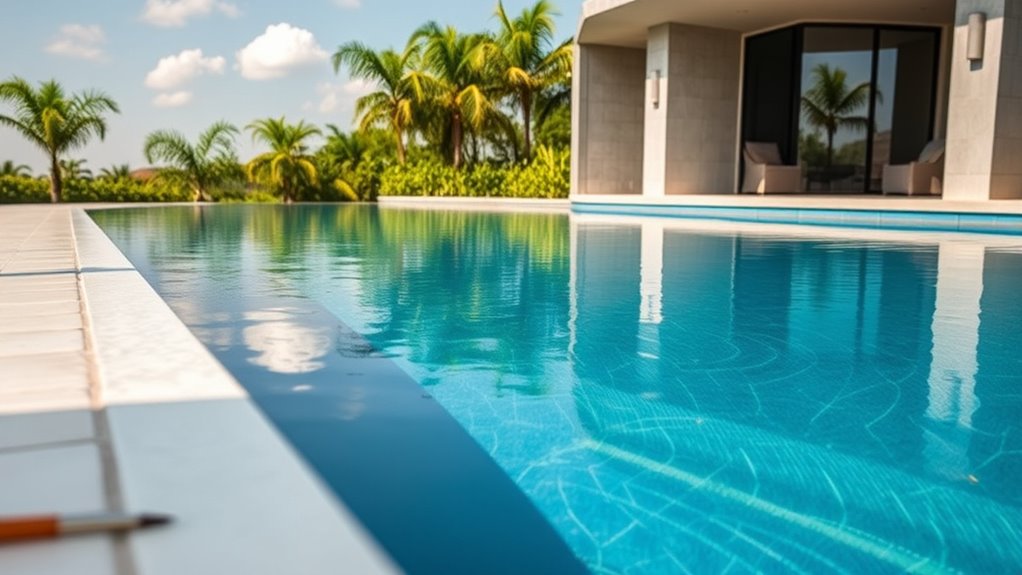
To achieve the best waterproofing results for your infinity pool walls, applying the chosen solution correctly is essential. Begin by thoroughly cleaning and preparing the surface, removing any dirt, grease, or loose material. Follow manufacturer instructions precisely regarding mixing and application techniques. Use appropriate tools like brushes, rollers, or sprayers to ensure even coverage. Pay special attention to corners, joints, and seams, applying extra layers if needed. Maintain consistent thickness across all areas to prevent weak spots. Avoid rushing; allow each coat to dry completely before applying the next. Proper surface preparation, correct application methods, and patience during the process will maximize waterproofing performance and longevity, ensuring your infinity pool walls remain protected against water infiltration. Applying the right coating is crucial for achieving durable and effective waterproofing results.
Maintenance and Inspection Tips for Long-lasting Protection
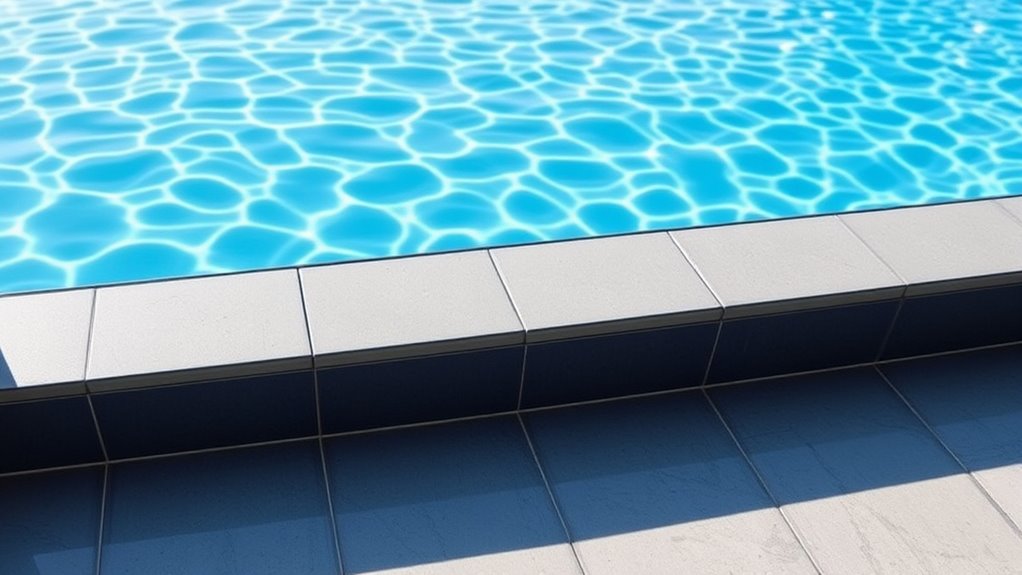
Regular maintenance and periodic inspections are essential to guarantee your infinity pool walls remain effectively waterproofed over time. Check the walls regularly for cracks, chips, or signs of water infiltration, especially after harsh weather. Clean the surface to prevent algae and dirt buildup that can compromise the waterproof coating. Inspect the grout lines and sealants, ensuring they stay intact and free of deterioration. If you notice any damage or wear, address it promptly by repairing or resealing to prevent leaks. Keep the pool’s water level balanced, as fluctuations can stress the waterproofing layers. Regularly inspecting and maintaining your pool walls helps identify issues early, extending the lifespan of your waterproofing system and ensuring your infinity pool remains beautiful and functional for years.
Innovations and Advanced Technologies in Pool Wall Waterproofing
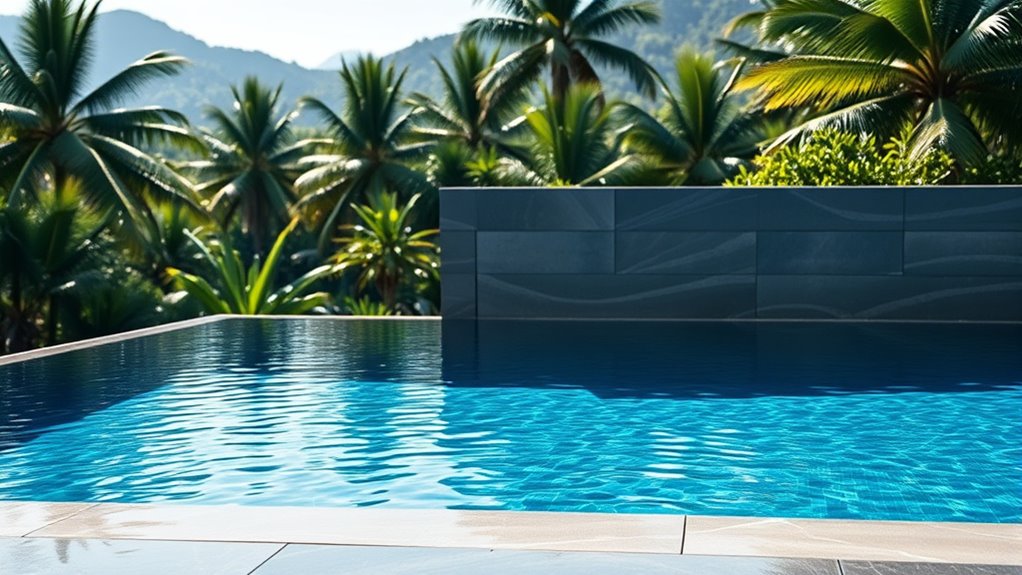
Innovations and advanced technologies are transforming how you protect your infinity pool walls from water infiltration. Modern materials and techniques are more durable, flexible, and efficient. For example, liquid-applied membranes create seamless waterproof layers, reducing leaks. Nanotechnology-based coatings repel water at a molecular level, extending lifespan. Underwater sensors monitor waterproof integrity in real time, alerting you to issues early. Additionally, waterproofing materials are continually evolving to provide longer-lasting solutions that withstand harsh environmental conditions. Here’s a quick overview:
| Technology | Benefit | Application |
|---|---|---|
| Liquid Membranes | Seamless, flexible protection | Coating walls and joints |
| Nanocoatings | Water-repellent, long-lasting | Surface treatment |
| Sensor Systems | Real-time monitoring | Detecting leaks early |
These innovations give you smarter, more reliable options for maintaining your infinity pool’s integrity.
Frequently Asked Questions
How Long Does Waterproofing Typically Last in Infinity Pool Walls?
Waterproofing in infinity pool walls typically lasts 10 to 15 years, but this depends on factors like the quality of materials used, installation, and maintenance. You should regularly inspect for cracks or leaks and address issues promptly to extend its lifespan. Proper maintenance and choosing high-quality waterproofing products can guarantee your pool remains well-protected for many years, saving you costly repairs later on.
Are Eco-Friendly Waterproofing Options Available for Infinity Pools?
Did you know eco-friendly waterproofing options are gaining popularity? Yes, they’re available for infinity pools. You can choose environmentally safe sealants made from natural or low-VOC materials, which reduce chemical runoff and are safer for you and the environment. These options work just as effectively as traditional products, providing long-lasting protection while helping you stay green. So, you don’t have to compromise safety or sustainability when waterproofing your infinity pool.
Can Waterproofing Materials Be Applied to Existing, Aged Pool Walls?
Yes, you can apply waterproofing materials to existing, aged pool walls. First, you need to thoroughly clean and repair any cracks or damages. Then, choose a compatible waterproof coating designed for pools, such as epoxy or rubberized sealants. Follow the manufacturer’s instructions carefully, ensuring proper surface preparation. This process effectively restores waterproofing, extends your pool’s lifespan, and prevents leaks or water damage.
What Are Common Signs of Waterproofing Failure in Infinity Pool Walls?
You’ll notice cracks, peeling paint, or bubbling on your infinity pool walls, which signal waterproofing failure. Water may seep through these areas, causing stains or mineral deposits on nearby surfaces. Increased water evaporation or a drop in water level can also indicate leaks. If you see mold or mildew around the edges, it’s a clear sign that moisture is escaping and the waterproofing needs immediate attention.
How Does Climate Influence Waterproofing Choice for Outdoor Infinity Pools?
Think of climate as the silent architect shaping your pool’s fate. In hot, sunny areas, you’ll want durable, UV-resistant waterproofing to prevent degradation from sun exposure. Cold climates demand flexible, crack-absorbing materials to cope with freeze-thaw cycles. Humid regions require breathable membranes to prevent mold. By choosing the right waterproofing based on your climate, you guarantee your infinity pool remains stunning and leak-free for years to come.
Conclusion
Think of your infinity pool walls as the shield guarding a precious treasure. Choosing the right waterproofing is like forging a strong, unbreakable armor that withstands the test of time and elements. When you select, apply, and maintain wisely, you’re ensuring that your oasis remains pristine and inviting. Remember, a well-protected pool is like a well-guarded secret—delicate yet resilient, offering endless serenity for years to come.
